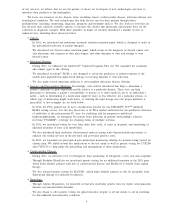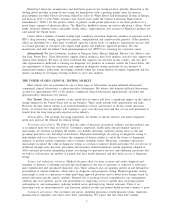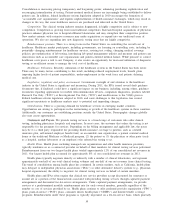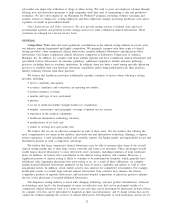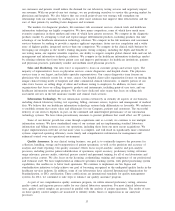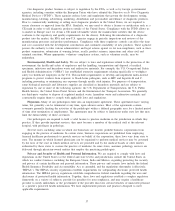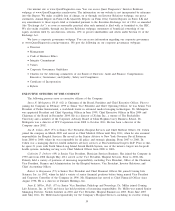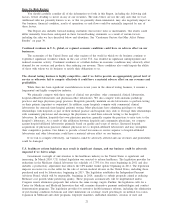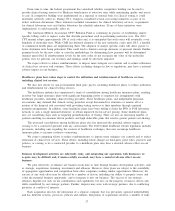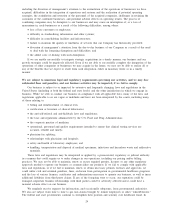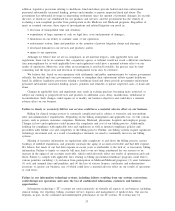Quest Diagnostics 2011 Annual Report Download - page 22
Download and view the complete annual report
Please find page 22 of the 2011 Quest Diagnostics annual report below. You can navigate through the pages in the report by either clicking on the pages listed below, or by using the keyword search tool below to find specific information within the annual report.Advantage” programs. There has been continued growth of health insurance plans offering Medicare Advantage
programs and of beneficiary enrollment in these plans. In recent years, in an effort to control costs, states also
have increasingly mandated that Medicaid beneficiaries enroll in private managed care arrangements. The 2010
federal healthcare reform legislation is intended to control the growth of Medicare Advantage programs,
encourage beneficiaries to switch back to traditional Medicare programs and expand the eligibility for traditional
Medicaid programs.
REGULATION
Our businesses are subject to or impacted by extensive and frequently changing laws and regulations in the
United States (at both the federal and state levels) and the other jurisdictions in which we conduct business.
These laws and regulations include regulations particular to our business, and laws and regulations relating to
conducting business generally (e.g., export controls laws, U.S. Foreign Corrupt Practices Act and similar laws of
other jurisdictions), including in the United States and in other jurisdictions. We also are subject to inspections
and audits by governmental agencies. Set forth below are highlights of the key regulatory areas applicable to our
businesses.
CLIA and State Clinical Laboratory Licensing Regulations. All of our laboratories and, where applicable,
patient service centers, are licensed and accredited as required by the appropriate federal and state agencies.
CLIA regulates virtually all clinical laboratories by requiring that they be certified by the federal government and
comply with various technical, operational, personnel and quality requirements intended to ensure that the
services provided are accurate, reliable and timely. The cost of compliance with CLIA makes it cost prohibitive
for many physicians to operate clinical laboratories in their offices. However, manufacturers of laboratory
equipment and test kits could seek to increase their sales by marketing point-of-care test equipment to physicians
and by selling to both physicians and patients test kits approved by the FDA for home use. Diagnostic tests
approved or cleared by the FDA for home use are automatically deemed to be “waived” tests under CLIA and
may be performed in physician office laboratories with minimal regulatory oversight under CLIA as well as by
patients in their homes.
CLIA does not preempt state laws that are more stringent than federal law. State laws may require additional
personnel qualifications, quality control, record maintenance and/or proficiency testing. State laws also may
require detailed review of our scientific validations and technical procedures for tests.
Fraud and Abuse Rules. Federal anti-kickback laws and regulations prohibit making payments or furnishing
other benefits to influence the referral of tests billed to Medicare, Medicaid or certain other federal or state
healthcare programs. The penalties for violation of these laws and regulations may include monetary fines,
criminal and civil penalties and/or suspension or exclusion from participation in Medicare, Medicaid and other
federal healthcare programs. Several states have similar laws.
In addition, federal and state anti-self-referral laws generally prohibit Medicare and Medicaid payments for
clinical tests referred by physicians who have a personal investment in, or a compensation arrangement with, the
testing laboratory. Some states also have similar laws that are not limited to Medicare and Medicaid referrals and
could also affect investment and compensation arrangements with physicians.
FDA. The FDA has regulatory responsibility over, among other areas, instruments, test kits, reagents and
other devices used by clinical laboratories to perform diagnostic testing in the United States. The FDA also
regulates clinical trials (and, therefore, may conduct inspections related to testing that we perform for sponsors of
those trials), drugs of abuse testing for employers, testing for blood bank purposes and testing of donors of
human cells for purposes such as in vitro fertilization. A number of esoteric tests we develop internally are
offered as laboratory-developed tests (“LDTs”). The FDA has claimed regulatory authority over all LDTs, but has
exercised enforcement discretion with regard to most LDTs performed by high complexity CLIA-certified
laboratories. During 2011, the FDA issued several draft guidance documents related to our business, including,
among others, guidance documents regarding software applications used for handheld devices, companion
diagnostics, products labeled RUO or IUO and enhancements to the 510(k) process. During 2012, the FDA plans
to issue three guidance documents regarding regulation of LDTs and clinical laboratories. The first concerns how
laboratories will register and list LDTs with the FDA, the second sets forth the risk-based scheme for LDT
classification and the third advises laboratories how to become compliant with Quality Systems regulations. If
finalized, each of these guidance documents could have a significant impact on our business. The regulatory
approach adopted by the FDA may lead to an increased regulatory burden on our Company, including additional
costs and delays in introducing new tests.
16


